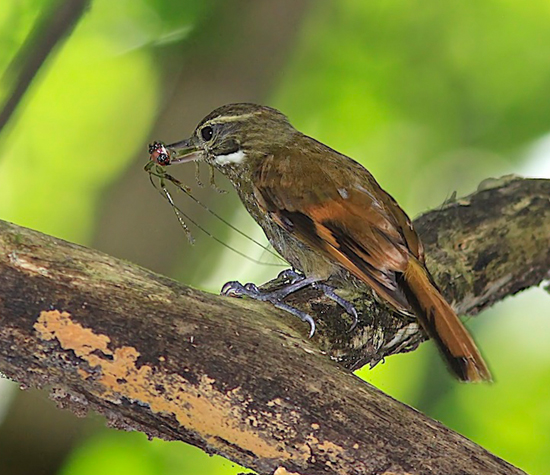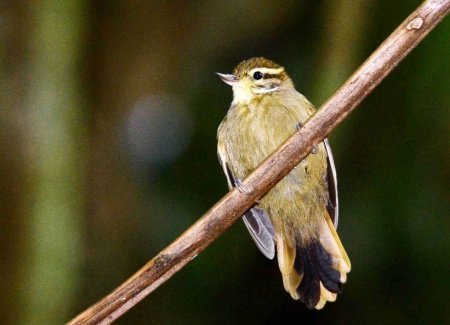- Xenops minutus
Identification
12 cm long, weighs 12 g. Light brown head, buff supercilium and whitish malar stripe. The upperparts are brown, becoming rufous on the tail and rump, and there is a buff bar on the darker brown wings. The underparts are unstreaked pale olive brown. The sexes are similar, but young birds have dark brown throats.
Distribution
Central America and South America
Central America: From Southern Mexico through Panama.
South America: west of the Andes in Ecuador and Colombia, and in northern Colombia connected with the large area east of the Andes where the species is found south to Bolivia and Brazilian Amazon. A separate population is found in the Atlantic Forest part of Brazil to Paraguay and northeastern Argentina.
Taxonomy
It is a member of the South American bird family Furnariidae, a group in which many species build elaborate clay nests, giving rise to the English name for the family of "ovenbirds".
Ten subspecies are recognized[1]:
- X. m. mexicanus
- X. m. ridgwayi
- X. m. littoralis
- X. m. neglectus
- X. m. remoratus
- X. m. ruficaudus
- X. m. olivaceus
- X. m. obsoletus
- X. m. genibarbis
- X. m. minutus
Habitat
Moist lowland forests.
Behaviour
The nest is made of shredded plant fibres placed in a hole between 1.5 and 9 m high in a decaying tree trunk or branch. 2 white eggs are laid, incubated by both sexes.
Diet includes insects.
References
- Clements, J. F., T. S. Schulenberg, M. J. Iliff, B.L. Sullivan, C. L. Wood, and D. Roberson. 2012. The eBird/Clements Checklist of Birds of the World. 6th ed., with updates to October 2012. Ithaca: Cornell Univ. Press. ISBN 978-0801445019. Spreadsheet available at http://www.birds.cornell.edu/clementschecklist/downloadable-clements-checklist
- Ridgely and Tudor 2009. Field guide to the songbirds of South America - The Passerines. University of Texas Press. ISBN 978-0-292-71979-8
- Restall et al. 2006. Birds of Northern South America. Yale University Press. ISBN 9780300124156
- Ber van Perlo. 2009. A field guide to the Birds of Brazil. Oxford University Press, New York, NY, USA. ISBN 978-0-19-530155-7





